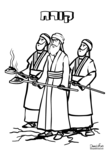I will be out of town this coming week, from Sunday, October 19, to Sunday, October 26. I will continue to prioritize rabbinic emergencies and other urgent communications, however, I will address other matters upon my return the following week.
Today is the yahrzeit of Rabbi Levi Yitzchok of Berdychiv (1740-1809, Ukraine), the author of the classic & seminal Chasidic work the Kedushas Levi (an English translation of which was published in 2023 by Mitchell "Moyshe" Silk, who also holds the distinction of being the first Hasidic Jew to hold a Senate confirmed senior US government position and who has published extensively on Chinese trade - read this profile of him).
Rebbe Levi Yitzchok, as recorded in Itturei Torah by MK Aharon-Yaakov Greenberg, z''l, died on the 25th of Tishrei, just two days after Simchat Torah. Rebbe Levi Yitzchok called his family and loved ones to him on the night after Yom Kippur to inform them that he had a dream in which it was revealed to him that that Yom Kippur was his time to pass away, yet he begged for his life to be extended out of a burning desire to be able to fulfill the mitzvot of Sukkot of Arba'ah Minim (lulav and etrog) and dwelling in the Sukkah. He was healthy through Sukkot, fell ill on the day after Simchat Torah, and died the following day. This story is a powerful account of the Jewish's people's love of Torah and mitzvot. It reminds us how valuable every moment that we have is and that we ought to live every moment and perform every mitzvah as though it could be our last.
We mourn the sudden death of Rabbi Moshe Hauer, z''l, executive vice president of the Orthodox Union, who died of unexpectedly in his home of a heart attack on Shemini Atzeret night. I encourage you to read some of the tributes that have been shared about him, or watch the recording of his levaya. He was a man of true character, spirit, vision, and integrity.
As we noted on Shemini Atzerret, we share in the overwhelming joy at the return of all of Israel's remaining live hostages: Matan Angrest, Gali Berman, Ziv Berman, Elkana Bohbot, Rom Braslavski, Nimrod Cohen, Ariel Cunio, David Cunio, Evyatar David, Guy Gilboa-Dalal, Maxim Herkin, Eitan Horn, Segev Kalfon, Bar Kupershtein, Omri Miran, Eitan Mor, Yosef-Haim Ohana, Alon Ohel, Avinatan Or, Matan Zangauker. Hodu Lashem Ki Tov Ki L'Olam Hasdo. Baruch Mattir Assurim.
We also mourn with the families of 9 murdered hostages who whose bodies were returned this week: Tamir Nimrodi, Uriel Baruch, Eitan Levi, Guy Illouz, Yossi Sharabi, Daniel Peretz, Bipin Joshi, Inbar Haiman, Muhammad el-Atrash. May their memories be blessing.
We join in demanding and davening for the immediate releave of the remaining 19 hostages whose bodies have not yet been recovered: Tamir Adar, Sahar Baruch, Itay Chen, Amiram Cooper, Ronen Engel, Meny Godard, Hadar Goldin, Ran Gvili, Tal Haimi, Asaf Hamami, Eliyahu Margalit, Joshua Loitu Mollel, Omer Neutra, Dror Or, Daniel Oz, Suthisak Rintalak, Lior Rudaeff, Arie Zalmanowicz. May their memories be a blessing, and may they speedily be brought to menuchat olamim, their final resting place.
VOTING REMINDER:
The next elections for New York State are in LESS THAN THREE WEEKS on Tuesday, November 4! Please be sure to vote as every vote counts! You may wish to consider voting early to ensure that you have the opportunity to vote.
If you are not registered... make this the year to register and vote!
Demographers, pollsters, politicians, and statisticians look at data on how communities, neighborhoods, religious and ethnic groups vote and use this information! Please keep that in mind and understand the need for our community to vote in high numbers.
Am Yisrael Chai.
Shabbat Shalom,
Rabbi Ben Kean


































































